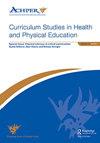Paradigms of health education in Aotearoa New Zealand: a heuristic for critiquing the promises, practices, and potential of school-based health education
IF 1.8
Q2 EDUCATION & EDUCATIONAL RESEARCH
Curriculum Studies in Health and Physical Education
Pub Date : 2022-02-16
DOI:10.1080/25742981.2022.2038646
引用次数: 3
Abstract
ABSTRACT In this paper, we draw upon Jensen’s ([1997]. A case of two paradigms within health education. Health Education Research, 12(4), 419–428; [2000]. Health knowledge and health education in the democratic health promoting school. Health Education, 100(4), 146–153) Danish work describing two paradigms of school-based health education. Although hailing from the other side of the globe, Jensen’s paradigms of health education are a useful heuristic for critiquing the promises, practices, and potential of health education as it is enacted in schools. Conducting a close read of a range of recent literature from Aotearoa New Zealand – in which a socio-critical orientation to health education is embedded in curriculum policy – we re-visit Jensen’s ideas to develop a contemporary view of the paradigms of health education as they are conceived and are put to work in health education in Aotearoa New Zealand. We explore implications for health education curriculum policy, classroom practice, and research into the subject arising from our extension to the paradigms of health education, taking the position that school-based health education is (still) yet to live up to its numerous promises and rich potential (Alfrey et al. [2021]. Learning about health through ‘intergenerational arts-led pedagogies’ in health and physical education: Exploring pedagogical possibilities. Sport, Education and Society, 26(8), 815–830; Fitzpatrick & Burrows [2017]. Critical health education in Aotearoa New Zealand. Sport, Education and Society, 22(5), 552–568; Leahy et al. [2016]. School health education in changing times: Curriculum, pedagogies and partnerships. Abingdon: Routledge).新西兰奥特亚健康教育的范式:批判校本健康教育的承诺、实践和潜力的启发式方法
在本文中,我们借鉴了Jensen的[1997]。健康教育中两种范式的案例。健康教育研究,12(4),419-428;[2000]。民主健康促进学校的健康知识与健康教育。健康教育,100(4),146-153)丹麦的工作,描述了两种以学校为基础的健康教育模式。虽然来自地球的另一边,詹森的健康教育范式是一个有用的启发式批评的承诺,实践和健康教育的潜力,因为它是在学校颁布。仔细阅读一系列来自新西兰奥特亚罗阿的近期文献-其中健康教育的社会批判取向嵌入课程政策-我们重新审视詹森的想法,以发展当代健康教育范式的观点,因为它们是在新西兰奥特亚罗阿的健康教育中构思和实施的。我们探讨了健康教育课程政策、课堂实践和健康教育范式延伸所产生的主题研究的影响,认为以学校为基础的健康教育(仍然)尚未实现其众多承诺和丰富潜力(Alfrey等人[2021])。通过健康和体育教育中的“代际艺术教学法”学习健康:探索教学的可能性。体育、教育和社会,26(8),815-830;Fitzpatrick & Burrows[2017]。新西兰奥特罗阿的关键健康教育。体育、教育和社会,22(5),552-568;Leahy et al.[2016]。变革时代的学校健康教育:课程、教学法和伙伴关系。阿宾顿:劳特利奇)。
本文章由计算机程序翻译,如有差异,请以英文原文为准。
求助全文
约1分钟内获得全文
求助全文
来源期刊

Curriculum Studies in Health and Physical Education
Social Sciences-Education
CiteScore
3.00
自引率
10.50%
发文量
33
 求助内容:
求助内容: 应助结果提醒方式:
应助结果提醒方式:


